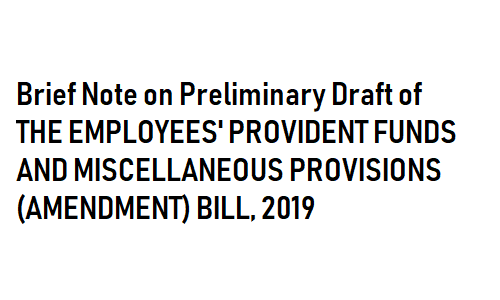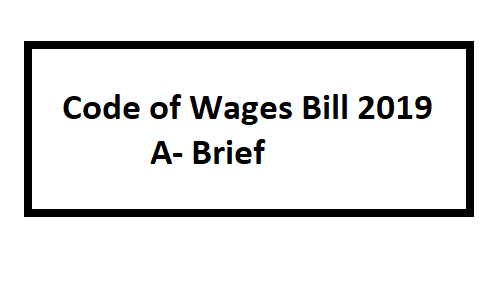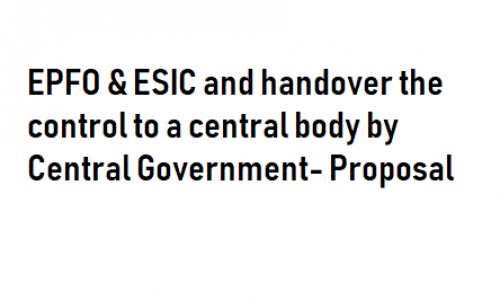Brief Note on Preliminary Draft of THE EMPLOYEES' PROVIDENT FUNDS AND MISCELLANEOUS PROVISIONS (AMENDMENT) BILL, 2019
The Employees' Provident Funds & Miscellaneous Provisions (EPF and MP) Act, 1952 is applicable to every establishment, employing 20 or more persons, which is either a factory engaged in any industry specified in Schedule-! of the Act or an establishment to which the Act has been made applicable by the Central Government by notification in the Official Gazette.
2. With the change in the industrial and economic scenario of the country lead ing to increased mobility of labour and outsourcing of services, need has been felt for introducing some amendments in the provisions of the Act.
3. The following are the details of the major amendment proposals:-
(a) Introduction of definition of 'wages' in conformity with the Code on Wages, 2019, passed by Parliament and assented to by the Hon'ble President, in place of existing definition of 'basic wage'. In the present form the computational basis for determining provident fund contribution is basic wage, DA and retaining allowance. The amendment seeks to fix computational basis at 'wage' with the further stipulation that allowances paid above 50% or as notified percentage, of all remuneration will be included in wage.
(b) The budget -2015-16 (Para 62), included an announcement that for employees below a certain threshold of monthly income, contribution to Employees Provident Fund (EPF) should be optional, without affecting or reducing the employer's contribution. Therefore, flexibility has been proposed to introduce in the Act to prescribe different rates of contribution for such period for any class of employee. This flexibility will enable, through notification, modification of the rates of contribution depending on various factors like age, income, gender etc. No change in employers' contribution has been proposed.
(c) Section 7 A of the Act does not provide any limitation for initiation of inquiries (i) to decide applicability of the Act to an establishment and (ii) to determine the amount due from any employer under any provision of the Act and the Schemes framed there under. Such a provision is susceptible to misuse and against a predictable policy for an employer / establishment. Various representations have been received to bring in limitation for scrutiny of the past cases. In case of the Employees' State Insurance (ESI) Act, 1948 and Income Tax Act, the limitation period of five years and seven years has been prescribed respectively.
Introducing limitation for inquiries under section 7 A has been included as one of the items of reform Therefore, it is now proposed to amend sub-section (1) of section 7 A to introduce a limitation period of 5 years to initiate inquiry. Further, in order to instil discipline in the working of assessing officers, a time period of two years, as far as practicable, has been provided to conclude the inquiry with further stipulation of submission of reasons for not concluding the inquiry within the stipulated period to the CPFC.
(d) Section 11 of the Act provides for priority of payment of contribution over other debts. The section mentions Presidency Towns Insolvency Act, 1909 and Provincial Insolvency Act 1920, both of which have been repealed vide the Insolvency and Bankruptcy Code, 2016. There is, therefore, requirement of rewording of the section by omitting references to the repealed statutes. The amendment proposes substitution of the existing section 11 .
(e) The provisions relating to penalties were last revised in the year 1988 and effective from 01.08.1988. Therefore, it is proposed to enhance the quantum of fines (in pecuniary terms) by ten times.
(f) Insertion of new section 14AD to provide for composition of certain offences under the Act except those specified in sub-section(1), sub-section(1A) and sub-section (18) of section 14 of the Act. This will provide a mutually agreeable disposition of minor offences without the need of conducting a complete trial in the Court. Small defaults in making compliance with the provisions of the Act could be resolved by paying up the compounding amounts at the specified rates without the need of a criminal tria l.
(g) The budget -2015-16 (Para 62), also included an announcement that the employees covered under the EPF & MP Act should be provided option for New Pension Scheme. It is proposed to insert new sections viz. sections 168 and 16C in the Act to give option to EPFO subscribers to opt for National Pension System (NPS), etc. in order to implement the Budget announcement(2015-16). The amended provisions will provide option to the EPF subscriber to opt for NPS in lieu of benefits under EPF & MP Act. The option to revert back to mechanism under EPF & MP Act is also being proposed. Further the definition of "National Pension System" under clause Ua) in section 2 of the Act.
(h) The present Act does not stipulate any pre condition for grant of exemption. The Standing Committee on Labour in its 26th report on "Exempted Organisations /Trusts / Establishments from EPFO:
Performance, Issues and Challenges" presented to Lok Sabha on 07.04.2017, had, inter-alia, recommended that proper strong guidelines may be prepared with regard to past performance, net worth,group performance etc. as well as minimum strength of workers, collections, contributions, corpus of the companies establishments, to grant exemption.



